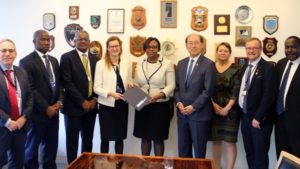 The International Maritime Organization (IMO) said a generic maritime “single window” software that will perform many different tasks relating to ship reporting and information exchange is now finished and will be made publicly available.
The International Maritime Organization (IMO) said a generic maritime “single window” software that will perform many different tasks relating to ship reporting and information exchange is now finished and will be made publicly available.
The Maritime Single Window System developed by Norway was formally handed over to Antigua and Barbuda, and the source code for the system will now be made available to other countries that need it, the IMO said in a release.
“New requirements which came into effect on 8 April 2019 require national governments to introduce electronic information exchange between ships and ports. The maritime single window is recommended,” it added.
A maritime single window enables all information required by public authorities in connection with the arrival, stay and departure of ships, people and cargo, to be submitted electronically via a single portal, without duplication. This type of system is recommended by IMO’s Facilitation Convention, the treaty which aims to reduce administrative burdens and make shipping and trade by sea more efficient.
The generic maritime single window system is not customized to any particular country, application or process, but will provide basic services to support the general acknowledged processes within any country that seeks to meet the obligations of the FAL Convention.
It is seen to help make cross-border trade simpler by performing various services typically relating to registering port calls and facilitating the clearance of ships, passengers and crew members.
The facility will allow submission of standardized information covered by the FAL Convention to a single entry point, including the ability to upload several spreadsheets (including Crew and Effects, Passenger and Ship Stores Lists).
The maritime single window source code developed during the project will be released under the Open Source MIT License and made available on the web-based hosting service GitHub.
IMO Secretary-General Kitack Lim said the IMO would also look into establishing an appropriate and permanent funding system to implement maritime single windows in other countries.
The project to implement a single window was launched in October 2017, installed in Antigua and Barbuda in June 2018, and then was tested and implemented. The fully functional generic maritime single window was delivered in December 2018. The final takeover of the system by Antigua and Barbuda was made in the first week of February 2019.
“The commencement of the pilot project (involving testing of the electronic procedures/parallel to existing procedures) launched on 8 March 2019 and will run to 31 October 2019. Transition to the full electronic system will commence on 1 November 2019,” said IMO.
Image courtesy of IMO
